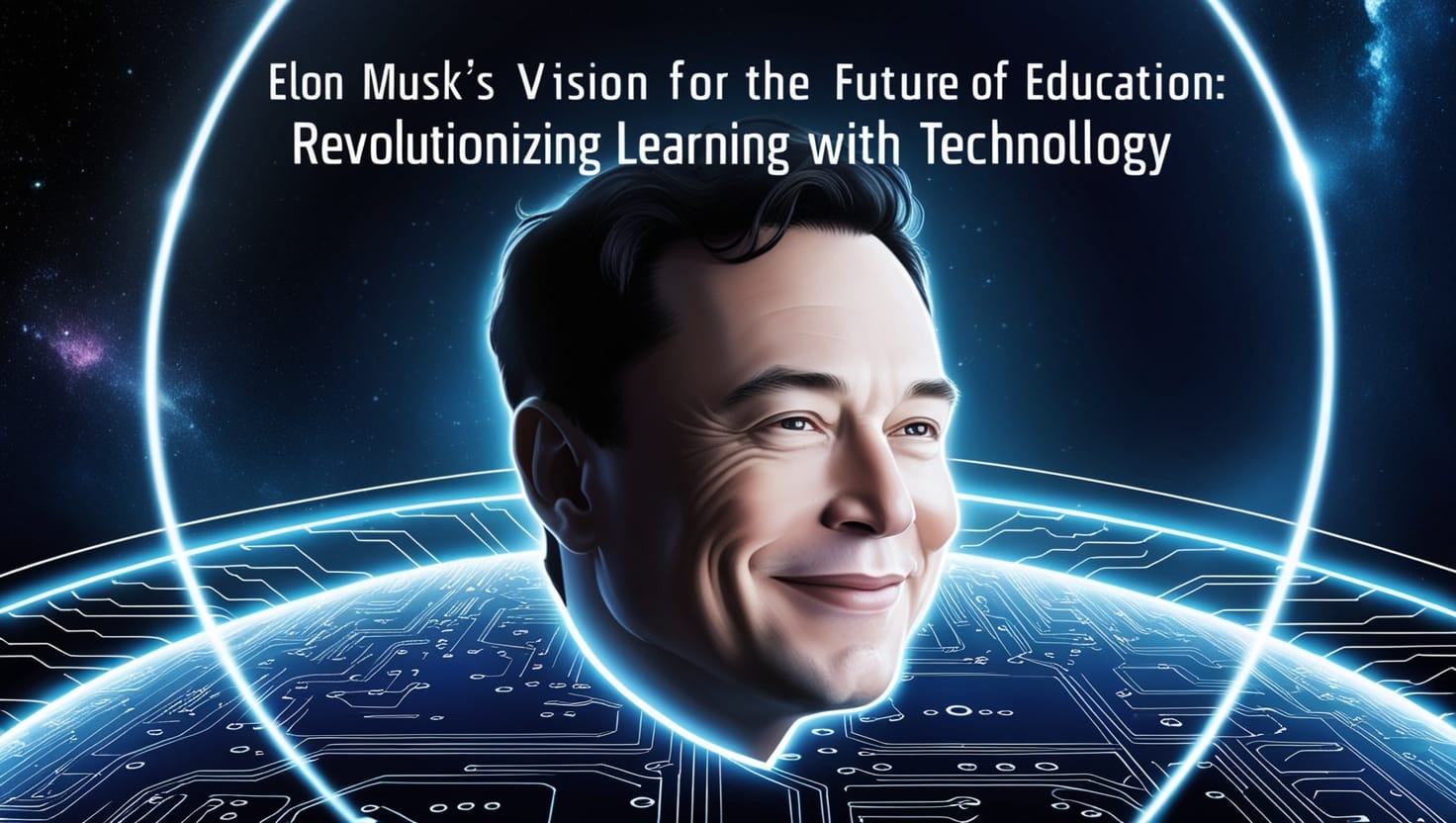
Elon Musk Vision for the Future of Education: Revolutionizing Learning with Technology-Elon Musk is known for his revolutionary ideas that have transformed industries, from electric cars to space exploration. However, one area that has recently captured his attention is education. As the founder of SpaceX, Tesla, Neuralink, and The Boring Company, Musk has long been an advocate for pushing the boundaries of technology. His vision for the future of education is no different—he envisions a world where technology plays a central role in reshaping how we learn, interact with knowledge, and prepare future generations for the challenges ahead. In this article, we explore Elon Musk’s vision for the future of education and how technology can help revolutionize learning.
A New Approach to Traditional Education
Traditional education systems, with their rigid structures, often fail to cater to the unique learning styles and needs of individual students. Elon Musk’s vision challenges the conventional approach to schooling. He believes that education should be more personalized, adaptive, and dynamic. In several interviews and public statements, Musk has criticized the “one-size-fits-all” model of traditional schooling. He advocates for more flexibility in how subjects are taught, emphasizing the importance of allowing students to learn at their own pace and explore subjects that spark their curiosity.
Musk’s ideal education system would allow students to focus on practical, hands-on learning rather than being confined to outdated methods that prioritize rote memorization. He argues that schools should be more aligned with real-world problem-solving, encouraging creativity, critical thinking, and innovation rather than just following a set curriculum.
Incorporating Technology to Enhance Learning

Technology has already begun to transform various industries, and Elon Musk’s vision for the future of education includes incorporating cutting-edge technology to improve the learning experience. One of the key components of his vision is using artificial intelligence (AI) to personalize education. Musk believes that AI can play a crucial role in creating learning systems that adapt to individual students’ needs, allowing for tailored lesson plans and personalized feedback.
AI-driven educational tools can identify where a student is struggling and automatically adjust the content to suit their learning style. For example, if a student excels in mathematics but struggles with reading comprehension, an AI-powered system could provide additional resources and exercises to help the student improve in that area. This personalized approach would help students progress at their own pace, fostering a deeper understanding of subjects and promoting a love for learning.
In addition to AI, Musk envisions using virtual reality (VR) and augmented reality (AR) to create immersive learning environments. These technologies can transport students into virtual worlds where they can interact with the material in ways that traditional classrooms cannot offer. Imagine learning about ancient civilizations by walking through a virtual Roman marketplace or studying biology by exploring a human cell from the inside. VR and AR provide a level of engagement that traditional textbooks simply cannot match, making learning more exciting and memorable. (Read More: The Role of Early Childhood Education in Children’s Development in 2024)
Education for the Real World

One of the biggest criticisms of the current education system is its disconnect from real-world applications. Elon Musk’s vision for education is to create a system that equips students with practical skills that will help them in their careers and everyday life. He believes that education should not only focus on theory but should also teach students how to apply what they learn to solve real-world problems.
For example, Musk’s initiatives at SpaceX and Tesla require a strong understanding of engineering, physics, and technology. However, he believes that education systems should also emphasize skills like problem-solving, adaptability, and collaboration—traits that are essential in today’s rapidly changing job market. Musk’s vision involves creating a learning environment that fosters these skills, preparing students for careers in fields that may not even exist yet.
By incorporating real-world challenges into the curriculum, students can learn how to approach complex issues, think critically, and work together to find innovative solutions. This hands-on approach can be applied across all disciplines, from science and technology to the arts and humanities. (Read More: Maximizing Your Education Credits on 1040: A Complete Guide for Taxpayers)
Breaking Down Barriers to Education
One of the most revolutionary aspects of Elon Musk’s vision for the future of education is his desire to make learning accessible to everyone, regardless of their location or socioeconomic status. Musk has always been a strong advocate for eliminating barriers to education, and he believes that technology can play a pivotal role in democratizing access to quality learning.
Through online platforms and open-source educational resources, students from all over the world can access high-quality learning materials. Companies like Khan Academy, which Musk has supported, offer free online courses that cover everything from mathematics to history. Musk also envisions a future where online education platforms are integrated with personalized learning tools powered by AI, making it easier for anyone with an internet connection to receive a world-class education.
Moreover, by using technology to deliver education remotely, Musk sees an opportunity to reach underserved communities in rural or developing areas. By eliminating the need for physical classrooms, technology can bridge the gap between students and educators, ensuring that no one is left behind. (Read More: 5 Differences Between AI Learning and Machine Learning in the Success of Learning)
The Role of Elon Musk’s Schools: Ad Astra and Astra Nova

To bring his vision to life, Musk has already taken a step forward with his experimental school, Ad Astra (which means “To the Stars” in Latin). Founded in 2014, Ad Astra was a private school that Musk created for his own children and a select group of students. The school followed an unconventional curriculum that focused on problem-solving, critical thinking, and collaboration rather than traditional subjects like history or geography. The students were encouraged to engage with technology and work on real-world engineering challenges.
While Ad Astra has since evolved into Astra Nova, Musk’s commitment to changing the way we educate remains clear. Astra Nova continues to focus on hands-on learning, using robotics, coding, and other technologies to inspire creativity and foster a love for innovation. These schools represent a testbed for Musk’s ideas about the future of education, and he has expressed his desire to expand the concept to other areas.
Conclusion article Elon Musk Vision for the Future of Education: Revolutionizing Learning with Technology
Elon Musk’s vision for the future of education is about much more than just incorporating technology into schools—it’s about revolutionizing how we think about learning itself. By embracing AI, VR, and personalized educational tools, Musk aims to create an education system that is adaptable, hands-on, and connected to real-world applications. His approach places a strong emphasis on teaching students how to think critically, solve problems, and collaborate—skills that are essential for thriving in the modern world.
Ultimately, Musk envisions a future where education is accessible to everyone, regardless of their background or location. Through technology, he hopes to break down the barriers that prevent many students from accessing quality education and provide them with the tools they need to succeed in a rapidly changing world. As Musk continues to push the boundaries of what is possible, his vision for education could very well be the catalyst for a global shift in how we teach and learn.




